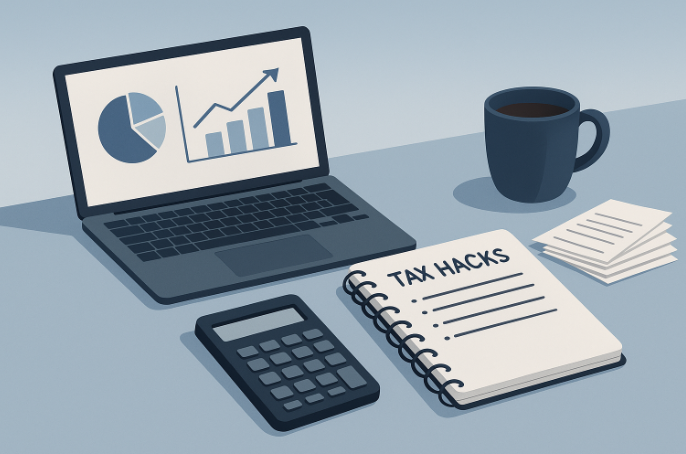
Small Business Tax Hacks: Structure, Bookkeeping, and Real Estate Deductions
Running a small business can be rewarding, but it comes with a heavy dose of financial responsibility. Between managing cash flow, navigating tax laws, and planning for growth, many business owners overlook valuable tax strategies that could save thousands each year. By taking a proactive approach to business structure, bookkeeping, and real estate deductions, you can optimize your taxes while staying compliant and organized.
This guide breaks down actionable steps every small business owner can implement to simplify taxes and maximize savings — without the overwhelming jargon.
Choosing the Right Business Structure
The way your business is structured directly impacts how much tax you pay and how profits flow to you as an owner. Whether you’re starting fresh or considering a restructuring, it’s important to weigh the pros and cons of each option.
Sole Proprietorship: The Simple Start
For freelancers, consultants, and one-person operations, a sole proprietorship is the most straightforward option. You report income and expenses on your personal tax return, which keeps filing simple.
When it works best:
- Low startup costs
- Minimal risk exposure
- Little to no need for liability protection
Drawback:
You’re personally liable for debts and legal claims, and you may miss out on certain tax planning strategies available with more advanced structures.
LLC (Limited Liability Company): Flexibility and Protection
An LLC offers liability protection while maintaining tax flexibility. Profits “pass through” to your personal return, but you can also elect to be taxed as an S corporation to reduce self-employment taxes.
Benefits of an LLC:
- Protects personal assets
- Easier to manage than a corporation
- Allows for tax planning flexibility
This structure is particularly useful for growing businesses that want more control over tax strategies without excessive administrative requirements.
S Corporation: Strategic Tax Savings
For small businesses generating consistent profits, an S corporation can unlock significant savings. By paying yourself a reasonable salary and taking the remaining profit as distributions, you reduce self-employment taxes while staying IRS compliant.
Pro Tip:
Work closely with a CPA to document your salary and distributions properly — this ensures you avoid penalties while maximizing your savings potential.
See also: Mobile Device Management in Business Environments
Streamlining Bookkeeping for Maximum Efficiency
Accurate bookkeeping is the foundation of smart tax planning. It allows you to track deductible expenses, prepare clean financial statements, and make informed decisions throughout the year.
Invest in the Right Tools
Cloud-based software like QuickBooks, Xero, or Wave simplifies transaction tracking, payroll, and invoicing. Automating these processes ensures nothing falls through the cracks — especially when reconciling bank statements during quarterly reviews.
Separate Business and Personal Finances
Mixing personal and business expenses creates headaches during tax season and increases your risk during an audit. Open a dedicated business bank account and credit card to keep your finances clean and organized.
Maintain a Real-Time Ledger
Waiting until tax time to update your books is a recipe for stress. Update your records weekly or biweekly, logging income, expenses, and receipts consistently.
For businesses in Washington, professional Seattle Tax preparation services can provide quarterly insights, helping you make proactive decisions instead of reactive fixes.
Leveraging Real Estate Deductions
If your small business owns or leases property, you have opportunities to claim powerful deductions that reduce your taxable income. These strategies can also benefit entrepreneurs running home-based operations.
Home Office Deduction
If you work from home, you may qualify for the home office deduction. The IRS allows you to deduct a portion of your home expenses — such as rent, utilities, and internet — if the space is used exclusively and regularly for business.
Simplified Option:
Use the IRS simplified method of $5 per square foot, up to 300 square feet, for an easy calculation without complicated record-keeping.
Depreciation on Owned Property
Businesses that own commercial real estate can deduct depreciation, spreading the cost of the property over several years. This deduction reduces your taxable income annually while maintaining accurate asset valuations on your balance sheet.
Leasehold Improvements
If you lease your business space, don’t overlook deductions for improvements or renovations. Items like flooring, signage, or built-in furniture can often be depreciated, offering tax relief while enhancing your workplace.
Mortgage Interest and Property Taxes
For businesses with financed properties, mortgage interest and property taxes are fully deductible. These expenses can add up significantly over the year and should be tracked meticulously in your bookkeeping software.
Timing and Planning for Tax Efficiency
Strategic timing can turn average tax planning into exceptional tax savings.
Accelerate or Defer Income
If your income fluctuates, consider accelerating income into the current year or deferring it to the next year based on your tax bracket projections. This flexibility helps optimize your overall tax burden.
Quarterly Estimated Payments
Avoid penalties and interest by making accurate quarterly estimated payments. By reviewing your financials every quarter, you can make adjustments and avoid cash flow surprises during filing season.
Leverage Section 179 and Bonus Depreciation
Purchasing equipment or vehicles for your business? Section 179 and bonus depreciation allow you to deduct the full cost upfront, providing immediate tax relief and encouraging reinvestment in your operations.
Common Mistakes to Avoid
Even well-intentioned business owners can make mistakes that cost time, money, and peace of mind. Here are pitfalls to watch for:
- Neglecting quarterly reviews: Waiting until year-end leaves no time for proactive planning.
- Poor documentation: Missing receipts or failing to categorize expenses accurately increases audit risk.
- Incorrect payroll setup: Misclassifying employees as contractors can lead to heavy IRS penalties.
- DIY tax filings without guidance: While small businesses can manage some tasks, strategic planning requires professional oversight.
When to Work With a Professional
Tax rules are complex and constantly evolving, making professional guidance invaluable. A CPA provides not just compliance but strategy — from entity selection to tax-saving recommendations tailored to your specific situation.
If your business involves multiple income streams, employees, or significant real estate assets, professional planning ensures every opportunity is maximized while minimizing risks.
Final Thoughts
Building a tax-efficient small business is less about chasing loopholes and more about thoughtful planning and consistent execution. By selecting the right structure, maintaining clean books, and fully leveraging real estate deductions, you position your business for long-term success and sustainable growth.
For tailored support and expert insights, explore trusted Small business tax services Seattle to help your company stay compliant and ahead of the curve.




